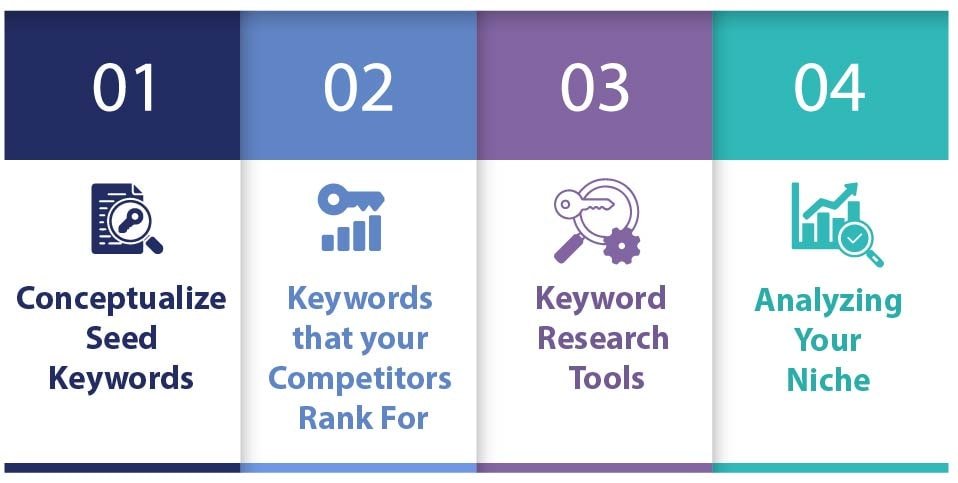If you are new to Search Engine Optimization (SEO), you may be unsure of what keyword research is and why it is so crucial. In the dynamic world of digital marketing, mastering the art of keyword research for SEO is paramount for achieving optimal search engine visibility. This comprehensive guide will navigate you through the intricacies of identifying, analyzing, and strategically incorporating keywords to enhance your website’s SEO performance. Whether you’re a seasoned marketer or just stepping into the realm of search engine optimization, this guide will equip you with valuable insights and practical techniques to elevate your online presence.
Get ready to unlock the potential of keywords and propel your website to the forefront of search engine results.
Keyword Research and its Importance

Keyword research helps you identify important search queries that your target consumers type to look for services, products, or information on search engines like Google. Many brands make the mistake of publishing data on topics that their target customers aren’t looking for and, thus, end up getting negligible traffic on GoogleKeyword research serves as a foundational pillar in your digital marketing strategy by enabling you to pinpoint the specific search queries your target audience employs to discover services, products, or information on major search engines such as Google.
A common misstep for many brands involves creating content that may be relevant but fails to align with what their prospective customers are actively searching for. This misalignment can lead to minimal visibility and traffic on Google, highlighting the crucial role of keyword research in ensuring that your content resonates with the actual needs and interests of your target audience, ultimately driving meaningful engagement and enhancing your online presence.
A Guide for Effective Keyword Research for SEO

Conceptualize Seed Keywords
The initiation of your keyword research methodology commences with a predetermined set of seed keywords. They assist you in determining your competition and defining your specialty. Every tool for keyword research requests a seed term, which it uses to produce a massive list of keyword suggestions.
If you have an existing service or business that you wish to market online, discovering seed keywords is a straightforward process. Just consider the search terms consumers would use to find what you have to offer.
For instance, if you own a library or sell books, you may identify the following words as your seed keywords:
- Genre
- Fiction
- Self-help
- Bookstore
- Audiobook
- Bookends
- Kindle Unlimited
- Novel
- Atomic Habits
- Epic reading
Keywords that your Competitors Rank For
Identifying your competitors and their SEO strategies is a great way to accelerate your keyword search. However, you must first recognize your competitors and this is where your list of seed keywords comes in handy. Just type one of your seed keywords into Google to see who comes up on the first page.
For instance, if your website sells coffee-making supplies, searching for “cappuccino maker” as opposed to “cappuccino” may reveal more potential competitors. That’s because blogs rank for the latter whereas e-commerce companies like yours tend to rank for the former.
Keyword Research Tools
As discussed, competitors provide a crucial source of trending keywords. However, there may be still a lot of keywords that your rivals haven’t yet optimized for. These can be located using a variety of keyword research techniques.
Google Keyword Planner is the most promising open-source keyword tool. Despite its original intent for individuals aiming to present paid ads on Google, it is available for free use to discover SEO keywords.
Google Keyword Planner can produce keyword suggestions that don’t necessarily include your seed keyword. For instance, take the keyword “lean food”. Unless you are a hardcore health and wellness connoisseur, you probably won’t know this keyword relates to healthy eating. GKP is therefore a great resource for coming up with non-obvious keyword suggestions.
Analyzing your Niche
While having access to a vast pool of potential keyword ideas is invaluable, the challenge lies in discerning the best among them. With millions of possibilities, manually sifting through each one becomes a nearly insurmountable task. The solution, however, is straightforward: leverage the power of SEO analytics to streamline and refine your keyword selection process.
By employing SEO analytics tools, you can efficiently separate the wheat from the chaff, identifying the most relevant and impactful keywords for your strategy. These tools provide valuable insights into key metrics, such as search volume, competition, and user intent, allowing you to prioritize keywords that align closely with your goals.
This data-driven approach not only saves time but also ensures that the keywords added to your list are strategically chosen, maximizing the effectiveness of your SEO efforts and contributing to the overall success of your online presence.
Conclusion
Effective keyword research is crucial for SEO as it helps you understand the search queries your target audience is using. By conducting thorough keyword research, you can optimize your website and content to attract more relevant organic traffic and improve your search engine rankings. Remember to use keyword research tools, analyze your competitors, and evaluate your niche to refine your keyword list and develop a successful SEO strategy.
Are you on the hunt for a potent digital marketing strategy? Your quest concludes right here! Uncover a variety of services on our website crafted to elevate your business substantially. Stop by today!
All images belong to their respective owners. Please email [email protected] if removal is required.




